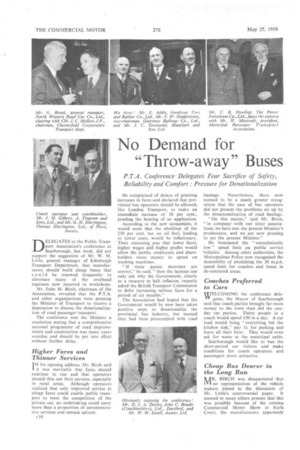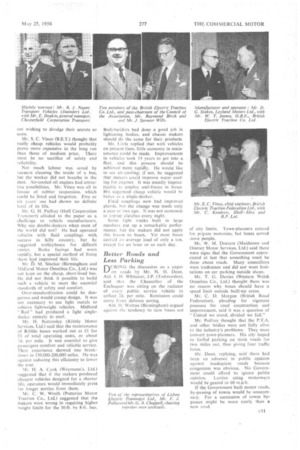No Demand for "Throw-away" Buses
Page 48

Page 49

If you've noticed an error in this article please click here to report it so we can fix it.
P.T.A. Conference' Delegates Fear Sacrifice of Safety. Reliability and Comfort : Pressure for Denationalization
ELEGATES to the Public Trans]) port Association's conference at Scarborough, last week, did not support the suggestion of Mr. W. M. Little, general manager of Edinburgh Transport Department, that manufacturers should build cheap buses that could be renewed frequently to eliminate many of the overhead expenses now incurred in workshops.
Mr. John M. Birch, chairman of the Association, revealed that the P.T.A. and other organizations were pressing the Minister of Transport to receive a deputation to discuss the denationalization of road passenger transport.
The conference sent the Minister a resolution stating that a comprehensive national programme of road improvements and construction was many years overdue and should be put into effect without further delay.
Higher Fares and Thinner Services
1N his opening address, Mr. Birch said it was inevitable that fares, should continue to rise and that operators should thin out their services, especially in rural areas. Although operators realized that only improved service at cheap fares could enable public transport to meet the competition of the private car, no undertaking could carry more than a proportion of unremuneraLive services and remain solvent.
c10 He complained of delays of granting increases in fares and declared that provincial bus operators should be allowed, like London Transport, to make an immediate increase of 10 per cent., pending the hearing of an application.
According to the new economists, it would seem that the abolition of the 250 per cent, tax on oil fuel, leading to lower costs, would be inflationary. Their reasoning „was that lower fares, higher wages and higher profits would allow the public, employees and shareholders more money to spend on washing machines.
" If these quaint doctrines are correct," he said, "then the layman can only ask why the Government, clearly as a measure to halt inflation, recently asked the British Transport Commission to defer increasing railway fares for a period of six months."
The Association had hoped that the Government would by now have taken positive steps to denationalize the provincial bus industry, but instead they had been preoccupied with road
haulage. Nevertheless, there now seemed to be a much greater recognition that the case of bus operators did not present the problems set up by the denationalization of road haulage.
" On this matter," said Mr, Birch, "in company -with our sister associations, we have met the present Minister's predecessor, and we are now pressing to see the present Minister."
He bemoaned the "unrealistically low" speed limit on public service 'vehicles. Among other authorities, the Metropolitan Police now recognized the desirability of abolishing the 30 m.p.h. speed limit for coaches and buses in de-restricted areas.
Coaches Preferred to Cars
WELCOMING the conference deleVV gates, the Mayor of Scarborough said that coach parties brought far more money to the town than did the oneday car parties. Thirty people in a coach would spend £30 in a day. A car load would bring " everything but the kitchen sink," pay Is. for parking and leave all their litter. They would even ask for water at the municipal caft.s.
Scarborough would like to ban the short-period car visitors and make conditions for coach operators and passengers more attractive.
Cheap Bus Dearer in the Long Run
ikAR, BIRCH was disappointed that IVI no representatives of the vehicle makers joined in the discussion of Mr. Little's controversial paper. It seemed to many others present that this was possibly because of the coming Commercial Motor Show at Earls Court, the manufacturers apparently
Slightly Worried! Mr. R. J. Nauen, Transport Vehicles (Daimler) Ltd., with Mr. E. Deakin, general manager,
Chesterfield Corporation Transport. not wishing to divulge their secrets so soon.
Mr, S. C. Vince (B.E.T.) thought that really cheap vehicles would probably prove more expensive in the long run than those of medium price. There must be no sacrifice of safety and reliability.
Not much labour was saved by vacuum cleaning the inside of a bus, but the worker did not breathe in the dust. Air-cooled oil engines had attractive possibilities. Mr. Vince was all in favour of rubber suspension, which could be fitted and forgotten. Five or six years' use had shown no definite limit of its life.
Mr. G. H. Pulfrey (Hull Corporation Transport) alluded to the paper as a challenge to vehicle manufacturers. Why use double-deckers when most of the world did not? He had operated vehicles with fluid couplings with, success in hilly country, but he suggested trolleybuses for difficult routes. Brake facings had worn rapidly, but a special method of fixing them h.f,.!cl improved their life. Mr. n. M. Sinclair (Birmingham and Midland Motor Omnibus Co., Ltd.) was not keen on the cheap, short-lived bus. fie did not think it possible to build such a vehicle to meet the essential standards Of safety and comfort.
Over-standardization could be dangerous and would cramp design. It was not necessary to use light metals to achieve lightweight vehicles. Midland " Red" had produced a light singledecker entirely in steel.
Mr. H. Bottomley (Ribble Motor Services, Ltd.) said that the maintenance of Ribble buses worked out at El for Eg of total operating costs, or about 3d. per mile. It was essential to give passengers comfort and reliable service. Their experience, showed one breakdown in 150,000-200,000 miles. He was against reducing this efficienby to lower the cost.
Mr. 1-1. A. Cook (Weyrnann's, Ltd.) suggested that if the makers produced cheaper vehicles designed for a shorter life, operators would immediately press for longer service from them.
Mr. C. W. Wroth (Potteries Motor Traction Co., Ltd.) suggested that the makers were wrong in requiring higher weight limits for the 30-ft. by 8-ft. bus.
Bodybuilders •had done a good job in lightening bodies, and chassis makers should do the same for their products.
Mr. Little replied that with vehicles on present lines, little economy in maintenance could be made. Improvements in vehicles took 15 years to get into a, fleet, and this process should be achieved more rapidly. He would like to see air-cooling; if not, he suggested that makers could improve water cooling for engines'. It was usually impracticable to employ anti-freeze in buses. His suggested cheap vehicle would he better as a single-decker.
Fluid couplings now had improved glands, but the change was made only a year or two ago. It was not economic to top-up clutches every night.
Sortie light trucks built in large numbers put up a remarkable performance, but the makers did not apply this lesson to buses. Yet most buses carried an average load of only a ton. except for an hour or so each day.
_Better Roads and Less Parking
DUR1NG the discussion on a paper on roads by Mr. N. H. Dean, Aid. I. H. Whitaker, J.P. (Todmorden), said that the Chancellor of the Exchequer was sitting on the radiator of every public service vehicle to collect 2d. per mile. Remission could come from defence saving.
Ald. H. Watton (Birmingham) argued against the tendency to turn buses out of city limits. Town-planners catered for priiate motorists, but buses served more people.
Mr. W. M. Dravers (Maidstone and District Motor Services, Ltd.) said there were signs that the Government appreciated at last that something must be done about roads. Many councillors were tradesmen and did not want limitations on car parking outside shops.
Mr. T. G. Davies (Western Welsh Omnibus Co., Ltd.) thought there was no reason why buses should have a speed limit outside built-up areas.
Mr. C. D. Morgan (British Road Federation), pleading for vigorous pressure for road construction and improvement, said it was a question of " United we stand, divided we fall."
Mr. Pulfrey thought that the P.T.A. and other bodies were not fully alive to the industry's problems. They must convert town-planners. His city hoped to forbid parking on main roads for two miles out, thus giving four traffic lanes.
Mr. Dean, replying, said there had been an advance in public opinion against inadequate roads because congestion was obvious. No Government could afford to ignore public opinion. Lorries using motorways would be geared to 60 m.p.h.
If the Government built motor roads, by-passing of towns would be unnecessary. For a succession of towns bypasses might he more costly than a new road,














































































































